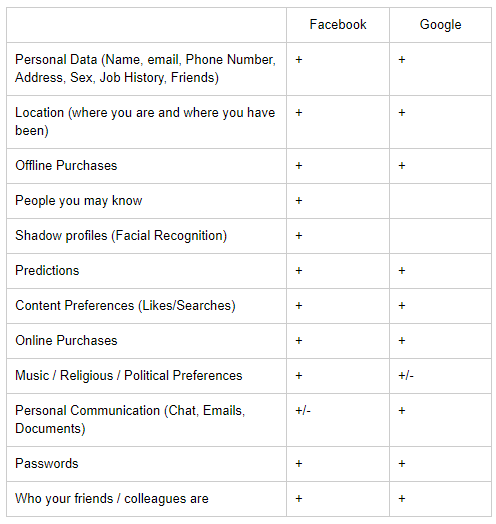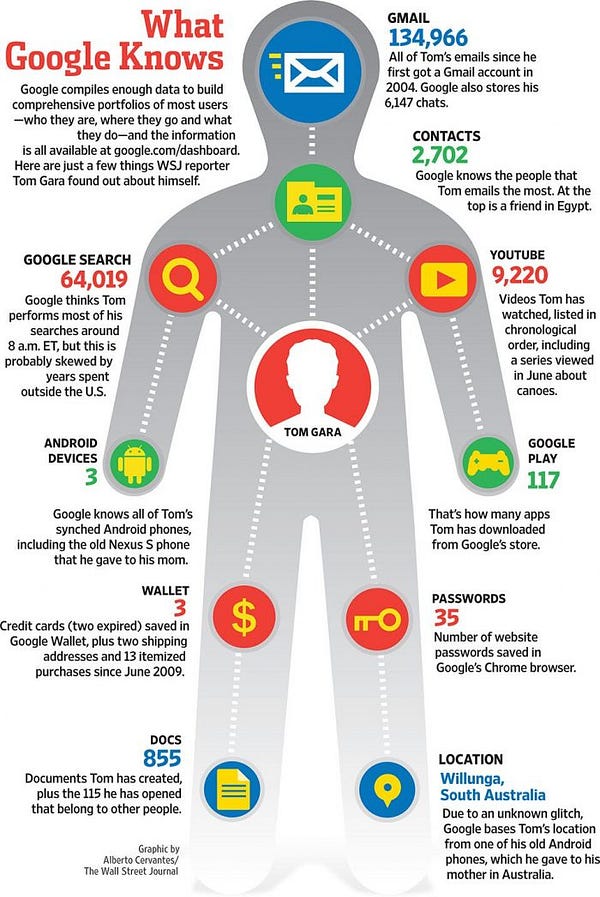The headlines of late have been full of questions about what the Internet knows about us. Every day with our internet browsing, credit card transactions, social media posts, and the very act of carrying our phones we leave digital crumbs for the big four (Apple, Google, Facebook, and Amazon). These companies, while they provide us products and services, they are also advertising platforms for every brand and marketplace in the world. Both traditional brands, retailers and new digitally driven brands use the data collected on us by the big 4 to drive consumer behavior to purchase, sign-up, or download their wares. As we learn as a society that even the big 4 aren’t infallible in the protection of our consumer data, what responsibility do we have to our own consumers in not only protecting their data, but also in how we use aggregated data in our marketing efforts to lure them into our purchase path?
To set the stage, let’s look at what Facebook and Google know about us:

The march towards one-to-one personalization has often masked the unintended consequences that this trove of data can have on our consumers and our businesses. As we collect this data, even in an anonymous fashion, we have an obligation to protect this data. In some cases, we may even have to consider situations where we may not want to use data sets, if it enables the crossing of a line. Don’t forget how Target, years ago had unwanted press for their use of using buying habits to target their consumers.
For example, if Amazon started to grant access to data on what its Alexa service collects, potentially giving access to passive conversation insights. Would we as eCommerce merchants want to exploit this new data set to drive consumer behavior? As brick and mortar retailers map out their stores and Google advances the capability of being able to locate a consumer in a specific aisle and cross reference that aisle to the goods sold, should we have access to that information? Let’s a consumer is shopping for a personal health item, should Google and in turn us as eCommerce merchants be able to access that data set and use it in our consumer influencing efforts?

From a social responsibility, the best thing that we can do as merchants is to be explicit and transparent with our consumers on what data we use to market to them. Including what we collect directly, what we collect through services like Facebook or Google unified log-in services, and what we use from data aggregation services. In Europe we all know what the impact of the GDPR is having on our business. We all assume that the U.S. may not be far be far behind in adopting GDPR or something similar. Think about the implications of having to be able to allow a user to delete all the information we know about them, including the lakes of data we are creating from data services? The cost to manage this requirement is just starting to hit corporations and in many cases, meeting the requirement may be very difficult, leading to fines being levied by regulators.
Being proactive is paramount in addressing this issue. Reading up on the GDPR requirements is a great place to start. Revisiting your privacy and data handling policies will be paramount. Finally, a healthy discussion on the obligation of protecting our consumers right to privacy in the context of driving revenue is warranted in this day and age.


